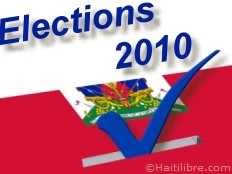Haitian All-Starz
The Best Representation of Haitian Entertainment, Culture, & LifeStyle
Haiti - Elections : Who does what ?
 |
National Democratic Institute (NDI) :
In the current electoral process, the National Democratic Institute (NDI) intervenes at the level of the electoral observation, the training of the representatives and the reinforcement of the capacity of political parties. Among its actions include the organization of civic education campaigns for the benefit of the population, the promotion of a culture of political tolerance for peaceful elections and assisting Haitian electoral observation groups. The NDI also encourages the organization of debates between candidates in order to help voters to make "an informed choices".
The International Foundation for Electoral Systems (IFES) :
The International Foundation for Electoral Systems (IFES) provides a technical and financial assistance to the CEP, involved particularly at the level of the formation, the civic education and voter awareness, as well as the accreditation of the local and national observers. This project is funded by USAID, in conjunction with its support to the electoral process through the 'Trust Fund' managed by the United Nations Development Programme (UNDP). In this second round, IFES has devoted its activities to awareness campaigns and training of the members of the polling stations.
Organization of the American States (OAS) :
Until 2010, the Organization of American States (OAS) has provided technical assistance to the Provisional Electoral Council (CEP), particularly in regard to the establishment of electoral lists, but also at the Tabulation Center. Regarding the elections 2010-2011, the OAS has for mandate the electoral observation and the training of the computer unit.
National Identification Office (ONI):
The National Identification Office (ONI) is the haitian body, responsible of the registry of national identification. Among its responsibilities include the provision and renewal of national identification cards (CIN). The ONI is also working with the Provisional Electoral Council in the establishment of the electoral lists.
United Nations Programme for Development (UNDP) :
UNDP provides advice and technical support in the organization of presidential and legislative elections in Haiti. This UN program is also responsible for managing the funds made available to Haiti by the international community for the organization of these elections. Funds that were used to purchase the electoral kits, to establish the Tabulation Center, and pay the salaries of the staff working at different levels of the electoral process.
Donors:
The European Union, the United States, Canada, Brazil, Japan and Venezuela, among others are the donors of the electoral process. The international financing represents 68% of 31 million dollars needed for the realization of the first and second round of elections in Haiti. The difference being the responsibility of the Government of Haiti.
UN Mission for Stabilization in Haiti (Minustah) :
The Minustah provides technical,logistics and security support to the CEP. Resulting by the transportation and the distribution of electoral materials to all voting centers across the country and its recovery after the election. On the security front, the peacekeepers and the UN police come in support of the Haiti National Police (PNH), in order to maintain a secure and stable environment during and after the elections.
Article by HL/ HaitiLibre
Social Network
All-StarZ TV
Events
Birthdays
Birthdays Today
Birthdays Tomorrow
© 2026 Created by Haitian All-Starz.
Powered by
![]()
 Haitian Gourde Converter
Haitian Gourde Converter



You need to be a member of Haitian All-Starz to add comments!
Join Haitian All-Starz